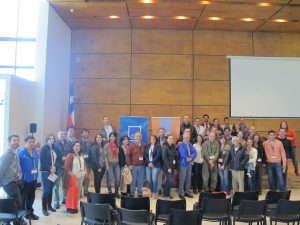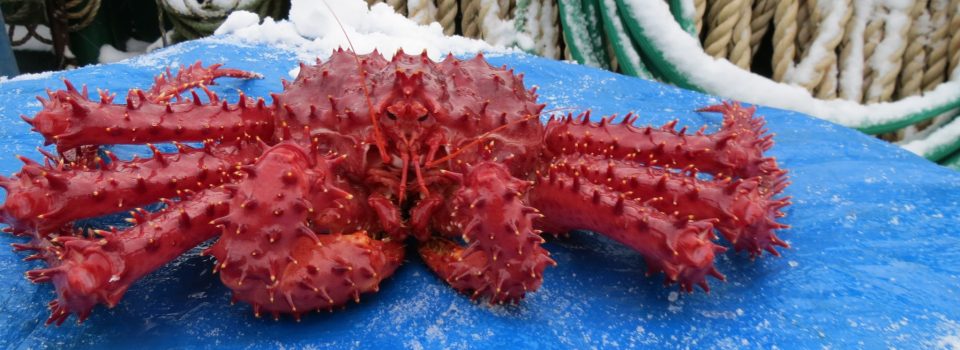Punta Arenas hosted Crab International Workshop
December 30th, 2016
Advances and prospects in the investigation of lithodid crustaceans, “Towards Sustainable Management and Exploitation of the Crab (Lithodes santolla) in the Eastern South Pacific”.
In Punta Arenas, the Instituto de Fomento Pesquero organized the international workshop: Advances and prospects in the investigation of lithodic crustaceans “towards sustainable management and exploitation of the crab (Lithodes santolla) in the Eastern South Pacific”. Important national and international researchers participated, among them, Bradley Stevens, professor of the Department of Natural Sciences, University of Maryland of United States, author and publisher of the book “King Crabs of the World”; Sharif Siddeek, international expert in evaluation of decapod crustaceans stock at the Bering Sea; Jorge Wyngaard, Carla Firpo and Cecilia Mauna, researchers of Instituto Nacional de Investigación y Desarrollo Pesquero (INIDEP) Mar del Plata Argentina, Federico Tapella, Paula Sotelano and Carolina Romero of Centro Austral de Investigaciones Científicas (CADIC) Ushuaia Argentina. Among Chilean researchers, Carlos Ríos from the Institute of Patagonia, Italo Campodónico, an independent fisheries consultant from the MCS, Erik Daza and Francisco Contreras from the Instituto de Fomento Pesquero.
Erik Daza, Head of IFOP in the Magallanes region, spoke about the importance of this workshop: “The present day is a milestone that crowns the work of more than 20 years of Instituto de Fomento Pesquero carried out in researching and monitoring of emblematic resources of artisanal fishing in the region, such as, the crab and Chilean snow crab. After an analysis of the challenges that are required for the management of these crustaceans, we have prioritized the organization of this workshop with the task of gathering in Punta Arenas for the first time researchers recognized worldwide who have dedicated many years to the generation of knowledge in aspects of biology, ecology, fishing, management and administration of lithodids. IFOP will lead a process that will build collaborative networks that integrate the world of science and users. Each year, we will report on the progress made in research, based on the framework and reference document built by the workshop participants, which seeks the sustainable exploitation of these species. I would especially like to thank my colleagues in the Crab Monitoring Program who have worked very hard to achieve this workshop.
Bradley Stevens, presented on the management and administration of fishery of the King Crab and perspectives for the cultivation of decapod crustaceans. He referred to the workshop: “It was very valuable to have gathered scientists from the Northern Hemisphere, Chile and Argentina to exchange experiences on the resource, it is very interesting to know the variety of crab fishery that exists and see that they have the same problems as in the rest of the world, I think we can all help one another”
Sharif Siddeek, explained about stock assessment models for the Colden crab in the Aleutian Islands. He stated “I really enjoyed the presentations of Chile and I found it very interesting what they are doing especially with the use of technology. In a fishery with poor data such as this, it is necessary to enhance the collection of information and to clean the collected data “.
Jorge Wyngaard, researcher of INIDEP, presented an overview of the Argentine Fisheries of King crab, in the Central Patagonian Sector, management and administration measures. He said “The truth is that it has been a very important opportunity for us to be able to be with colleagues who work in the same area. The organization has been very good and from now we thank the invitation that they have made us, because otherwise we could not have attended. ”
Federico Tapella, researcher of CADIC presented on Biological Bases for the management and recovery of the crab fishery in the Beagle Channel, he stated “It seems to me a very interesting activity, because it brings together different sectors with interests in the fishing of the crab, and because of international nature, different problems are discussed and is a good way to find solutions to those problems.”
IFOP, within the framework of its strategic role of generating, developing and transferring useful knowledge, which will allow our country and the national industry to position itself, competitively and sustainably, in the aquaculture and fisheries sector, will enhance the implementation of this type of initiatives in Magallanes with the objective to strengthen the research that develops in regions.
